#maddaddam
Text




vote yes if you have finished the entire book.
vote no if you have not finished the entire book.
(faq · submit a book)
8 notes
·
View notes
Text

56 notes
·
View notes
Text
“All it takes,” said Crake, “is the elimination of one generation. One generation of anything. Beetles, trees, microbes, scientists, speakers of French, whatever. Break the link in time between one generation and the next, and it’s game over forever.”
Oryx and Crake (MaddAddam, #1) by Margaret Atwood
#book quote#oryx and crake#margaret atwood#maddaddam#madd addam#fantasy#dystopia#quote#quotes#booklr#bookblr
12 notes
·
View notes
Text

46 notes
·
View notes
Photo

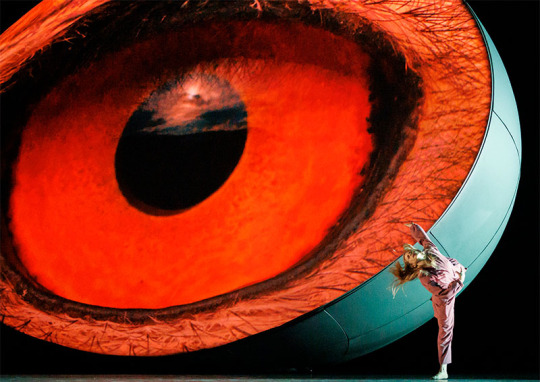

Wayne McGregor’s Maddaddam (National Ballet of Canada, 2022)
Photos by Karolina Kuras and Bruce Zinger
21 notes
·
View notes
Text
Little Book Review: General Fiction Round-Up (May-December 2022)
Maddaddam by Margaret Atwood (2013): In the final volume of Atwood's environmental dystopian trilogy (preceded by Oryx and Crake and The Year of the Flood), the survivors of a manmade eco-fascist plague, along with a population of genetically engineered humanoids, must try to make a life in the ruins. Atwood is one of my favorite authors and, while I generally prefer her non-speculative fiction, I really enjoyed the whole trilogy. She's really engaged with the ideas she explores (mostly related to GMOs and income inequality) and grounds them vividly in everyday life. I especially like the way the genetically engineered humanoids (the Crakers) process the world around them.
The Testaments by Margaret Atwood (2019): In the sequel to The Handmaid's Tale, Atwood tells the story of three women in the same universe: a Commander's daughter in Gilead, a daughter of Mayday operatives living in Toronto, and Aunt Lydia, first seen "training" Handmaids in The Handmaid's Tale. I liked The Handmaid's Tale in high school, but I can't say I came away wanting to know more about that world...yet, as it turns out, I totally did want to know more about the pastel horrors of an elite Gilead girlhood. The audiobook is also top-notch, with Ann Dowd, Ann Whitman, and Bryce Dallas Howard doing the three main POVs.
Magic for Beginners by Kelly Link (2005): In nine "short" stories (many of them are quite long), Link writes about absurd things happening in mundane settings. Pretty Monsters, another short story collection of hers with some overlap, was one of my favorite books I read in 2014, but this time I wasn't feeling it. I'd already read the three best entries: "Stone Animals" (about a nebulously haunted house in a suburb of NYC), "Magic for Beginners" (about a mysterious TV show and a teen boy whose father is maybe trying to murder him via writing a novel), and "The Faery Handbag" (about a girl whose grandmother carries around an entire lost country in her purse). The others never really came together. I might have lost my taste for whimsy.
Dune by Frank Herbert (1965): In the very distant future, fifteen-year-old Paul Atreides has to move to a different planet for his father's work, and it only gets worse from there. I resisted reading Dune for the longest time because it sounded as dry as a desert planet where you have to reabsorb your own urine to survive. However, it fucks. I loved the layers of power dynamics and game-playing, especially in the scenes with Lady Jessica. Evil, horny Baron Harkonnen and his weirdly tragic nephew Feyd-Rautha were also great. I didn't like it so much after the time skip, though, and I think I'll give the sequels a pass.
The Final Girl Support Group by Grady Hendrix (2021): Paranoid and reclusive after being targeted twice by Christmas-themed killers, Lynette Tarkington's social life consists of a support group for "final girls" (women who have survived grisly massacres that were adapted into horror movies). I never quite got on board with this one, for two major reasons. The first is that I was irrationally annoyed by the idea that horror movies were seemingly all one-to-one true crime stories in this universe. That's on me. The second is that Hendrix never managed to convince me that most of these women had ever had a significantly positive relationship with each other. This novel could've been a Toast article.
Horrorstör by Grady Hendrix (2014): Amy, a cash-strapped and unhappy twenty-something working at an IKEA knockoff, is offered a transfer to a better store if she'll stay after-hours to investigate some strange recent happenings. This isn't my favorite Hendrix novel; however, it is the fucking scariest. The characterization isn't as rich as it is in most of his other novels--I would describe it as efficient--but the pacing is effectively brisk and the nature of the fake-IKEA haunting almost made me shit my pants.
We Sold Our Souls by Grady Hendrix (2018): Kris Pulaski, once a guitarist/songwriter for up-and-coming heavy metal group Dürt Würk, now lives a life of resignation as a hotel night manager. Meanwhile, her ex-bandmate Terry Hunt is still a massively successful rock star after going nu-metal...and suddenly Kris has reason to believe that he did something truly sinister to make that happen. After My Best Friend's Exorcism, this is my favorite Hendrix novel. He's unusually moderate in putting his heroine through the mill, both in terms of physical peril and self-flagellation, and balances it with the joy she finds in her creative life. The otherworldly threat she faces is nicely chilling, and I loved the bittersweet ending.
Stranger Things: The Other Side by Jody Houser (2019): In this tie-in comic to Stranger Things, we see the first season from twelve-year-old Will Byers's point-of-view as he struggles to survive in the Upside Down. There's some good characterization of Will and a few cool visuals, but overall it's pretty inessential. The writing is kind of flat and sometimes awkward, and the art style is overall muddy and unappealing.
Mysterious Skin by Scott Heim (1995): Neil and Brian, two kids growing up in the same midsized Kansas town, both have life-altering traumatic experiences in the summer of 1981. Brian doesn't remember what happened, and comes to believe in the following years that he was abducted by aliens; Neil knows exactly what went on between him and his sexually predatory Little League coach, but that doesn't mean he understands it. Several years ago, I saw the 2004 movie version, which is amazing both as an adaptation and on its own terms: nuanced, well-paced, beautifully acted and shot, and faithful to all that's good in the source material. Unfortunately, this did slightly lessen the impact of the (also stellar) novel.
Ghost Wall by Sarah Moss (2018): In the early 1990s, working-class seventeen-year-old Silvie spends a summer holiday in a Northumberland village, reenacting Iron Age life with her churlish history buff father, her downtrodden mother, a pompous anthropology professor, and three of his students. It's promising to be more miserable than your average family camping trip, between the lack of modern tech/food and Silvie's father's domestic tyrannies, but are we getting into The Wicker Man territory? This is a tense, deliciously creepy, and lyrical little novella that I finished in one evening because it was so exciting.
Normal People by Sally Rooney (2018): Withdrawn rich girl Marianne, despised at home and at school, starts a no-strings-attached relationship with working-class Connell, who's handsome and bright but kind of a follower. Thus begins an on-again, off-again thing that will follow them through college and change them forever. I really liked this romance between two troubled yet essentially sensible and sweet college students, although it's a bit slow at times. I especially enjoyed the first time that Connell and Marianne's power dynamic flips; she's kind of an It Girl at university, while he's out of his depth.
Summerwater by Sarah Moss (2020): Several families "enjoy" a miserable summer holiday by a Scottish lake over the course of a rainy day. We get the perspectives of several vacationers--judgmental moms, crotchety old men, worried newlyweds, teenagers desperate for wifi and privacy, anxious little kids--with several dark hints that someone will meet a terrible fate. Moss's writing is pleasurable to read and often funny, but I needed a damn flow chart for these people.
The Brittanys by Brittany Ackerman (2021): Brittany, a Floridian high school freshman in 2004, navigates life in her gated community and her suburban high school, hanging out with her friends (most of whom are also named Brittany) and wearing low-rise jeans. Maybe I was unduly influenced by the author being named Brittany, but this novel reads like a bunch of fond adolescent memories with the occasional gesture at some larger meaning. It feels like the author couldn't decide between trying to do an emotional mid-oughts coming-of-age story (like Lady Bird) or a slice-of-life portrait of a certain type of high school experience (like Fast Times at Ridgemont High). The stakes aren't high enough for the first (the biggest through-line is that Brittany's BFF Brittany might be a lesbian but neither of them seems to know it) and the scope isn't wide enough for the second. I think the book would've been better off as, like, two short stories.
#little book review#maddaddam#the testaments#margaret atwood#magic for beginners#kelly link#dune#frank herbert#the final girl support group#horrorstör#we sold our souls#grady hendrix#stranger things: the other side#jody houser#mysterious skin#scott heim#ghost wall#summerwater#sarah moss#normal people#sally rooney#the brittanys#brittany ackerman
8 notes
·
View notes
Text
“There's the story, then there's the real story, then there's the story of how the story came to be told. Then there's what you leave out of the story. Which is part of the story too.”
-Margaret Atwood
6 notes
·
View notes
Text
Finished Maddaddam, good book, although not as good as anyone in her generation is going to write
. . . which is fine because it's plenty good anyway
Maddaddam is a kind of direct sequel to the tenth book in the trilogy, the one that got panned by a lot of reviewers. The one with the elephants and the giant killer wheel. It was the one that I had planned to skip at one point because it was so different from the rest and I guess I just never got around to it. But anyway it turned out to be really good and I've gotten more used to Atwood's style, so I read Maddaddam and realized that it was pretty much a return to the tone of the previous books.
3 notes
·
View notes
Text
She'd waited so long, she'd given up waiting. She'd longed for this, and denied it was possible. But now how easy it is, like coming home must have been once, for those who'd had homes. walking through the doorway into the familiar, the place that knows you, opens to you, allows you in. Tells you the stories you've needed to hear. Stories of the hands as well, and of the mouth.
I've missed you. Who said that?
A shape against the night window, glint of an eye. Dark heartbeat.
Yes. At last. It's you.
(p.46)
She and Zeb should have been limp, enervated, exhausted. But instead they'd snuck away from the others even earlier than usual, slippery with longing, every pore avid, every capillary suffused, and thrashed around like newts in a puddle.
Now it's deep twilight. Purple darkness wells up from the earth, bats flit past like leathery butterflies, night flowers open, masking the air. They're sitting outside in the kitchen garden for the evening breeze, what there is of it. Their fingers are loosely entwined; Toby can feel, still, a small current of electricity moving between them.
(p. 106)
Toby and Zeb finally find each other in Margaret Atwood's MaddAddam, the last book in the Oryx and Crake trilogy.
#dystopian literature#literature#Margaret atwood#maddaddam#oryx and crake trilogy#books#reading#fiction#I really like that first scene#it's so short#it's so telling
0 notes
Text

currently reading
0 notes
Text
narrator is unreliable bc they're deliberately withholding information from the reader vs narrator is unreliable bc they're an idiot
#i have to read the maddaddam books for class and man jimmy/snowman is kind of an idiot#hes well meaning and is a product of his incredibly fucked up environment#but hes thick as a brick and half the book is him realizing there were multiple points where he could have prevented crake from#doing what he was doing
2 notes
·
View notes
Text
I got too trusting about books utilizing unreliable narrators, like I always go “oh this is a tool that’s going to be used to challenge our preconceptions”
and so I go through entire books going like “yeah but this character presented as a romantic rival is sympathetic actually” or “this love interest who doesn’t respect women is going to end up being shown for what he is” and then the author is like “no :)”
#margaret atwood's maddaddam trilogy like. i got so mad.#i think all authors are about to pull at the very least a cersei and they never do
3 notes
·
View notes
Text
It’s always struck him how the toughest and most bitchy girls had the schmaltziest, squishiest doodads in their bedrooms.
Oryx and Crake (MaddAddam, #1) by Margaret Atwood
#book quote#oryx and crake#margaret atwood#maddaddam#dystopia#fantasy#science fantasy#quote#quotes#booklr#bookblr
4 notes
·
View notes
Text
Margaret Atwood's MaddAddam trilogy is quickly consuming my free time in a way i hadn't expected
i love reading but for the longest time i hadn't been able to be so immersed in books as i used to be, but this is different, very reminiscent of those old days :3
the passage about the Martha Graham Academy was very interesting as an artist and former BA student, but the whole thing is just very good and the translation is stellar even though i mourn the loss of the raccoon part of rakunks :D
#a görmenyek is nagyon cukik ebben biztos vagyok de a mosómedve 😭😭😭#anyways me like book#me wishes i had more time to read book#started the first one on sunday when my family and i went out to sit next to the Danube and chill#read like 200 pages in one sitting it was such an amazing feeling#since then i went onto the second book today#fascinating concepts all around i'm having fun but also getting pissed at the world we live in#which... yea that's the point lol#maddaddam trilogy#oryx and crake#oh also yea it has some very deeply disturbing stuff so y'know proceed with caution
0 notes
Photo
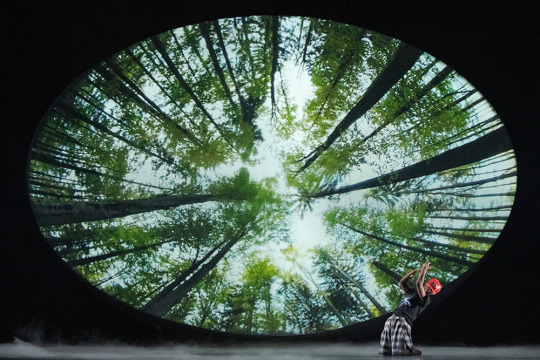
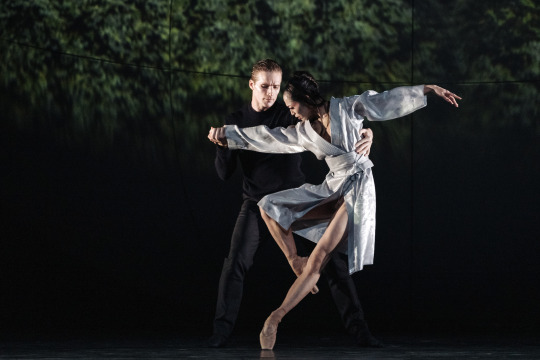

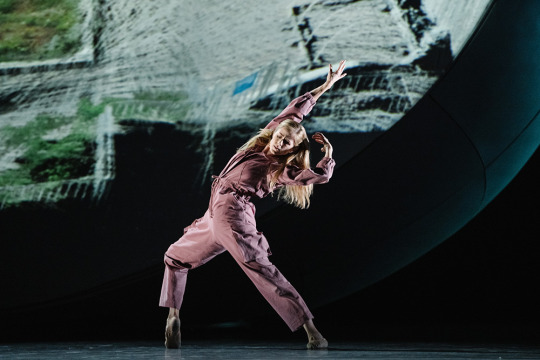

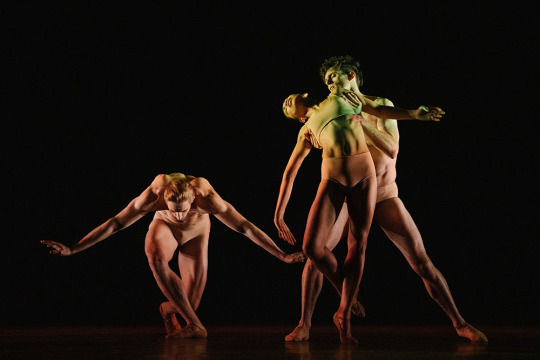
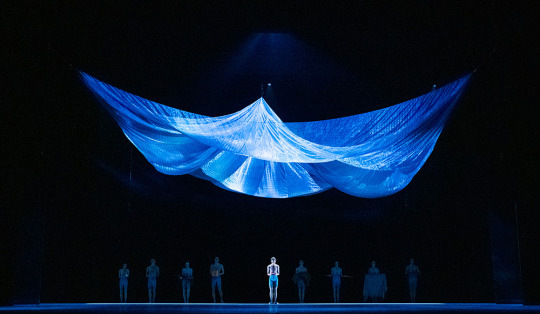
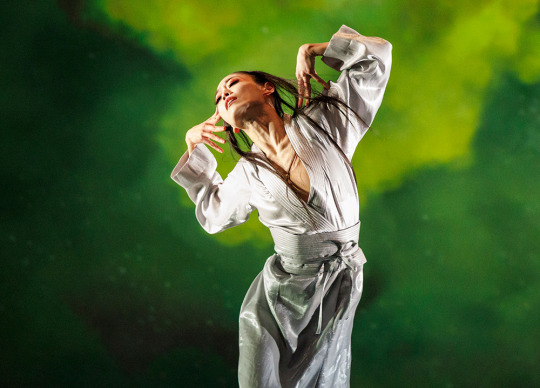
Maddaddam (National Ballet of Canada, 2022)
Choreography: Wayne McGregor
Music: Max Richter
Dramaturgy: Uzma Hameed
Stage design: We Not I
Costume design: Gareth Pugh
Lighting design: Lucy Carter
Film design: Ravi Deepres
Photos by Karolina Kuras and Bruce Zinger
3 notes
·
View notes
